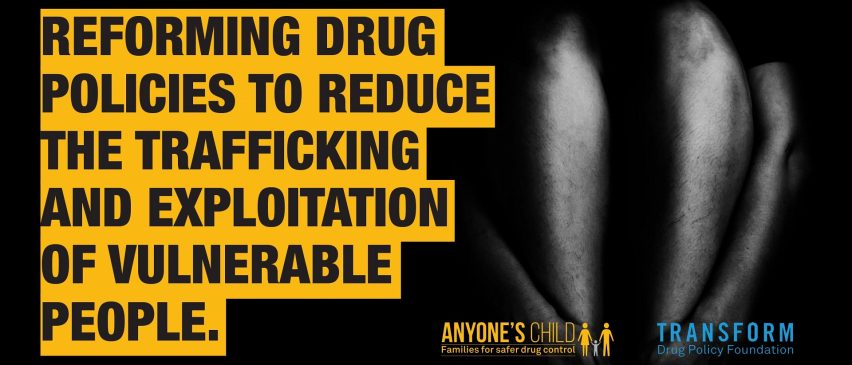

A long overdue discussion is now opening up, looking beyond the obvious risks associated with unsupervised, street drug use, and exploring the interactions between drug policies and the trafficking and exploitation of vulnerable people. This includes exploitation (including sexual abuse) in drug supply networks and criminalisation, which marginalises women and drives them away from important support mechanisms.
Anyone’s Child: Families for Safer Drug Control is a network of families who have suffered some of the most adverse effects of drug prohibition. Many have lost friends and family members to accidental overdoses, others have loved ones who have been criminalised and imprisoned for non-violent drug offenses. All are campaigning for change. Our new briefing, Reforming drug policies to reduce trafficking and exploitation of vulnerable people, explores how drug policies have created opportunities to manipulate, exploit and enslave vulnerable people and proposes new ways of addressing these harms.
Organised crime groups are known to target vulnerable people for trafficking and exploitation within the illegal drug trade. They are considered to be easier to exploit and intimidate, and are readily replaced. This means that women who have suffered from intense personal trauma, which may stem from childhood abuse or sexual violence, are particularly at risk. Those who have experienced such trauma are also far more likely to get involved in problematic drug use, leaving them even more vulnerable to exploitation.
Zara’s story illustrates the cruelty of this phenomenon:
I came to Bristol in my twenties and fell in love with my partner. We became friends with another couple who were using too; the woman said, ‘come out on the street with me’. It was a freezing cold November, I was ill and I was desperate. I’ll never forget the feeling of absolute horror when I realised girls were selling themselves for so little money.
My reality was dawning on me. I continued on and off for about six months. I’d be affected for days, not being able to tell anyone, and the men just, uh, just made my skin crawl.
I tried to stop but I couldn’t stick to it and my relapse was horrific. The using was getting really dangerous. I was badly raped and robbed by a dealer. I started doing recovery meetings in another city but started using again. I lived in a hotel for a couple of weeks with these two drug dealers, sleeping with both of them for my drugs.
A friend helped me into a dry-house – that lasted a week. I went to another friend, detoxed, used again. I was using, street-working, using, street-working…
Eventually I got help and got into treatment. It’s taken a long time to get to the point where I am even able to cry. Stuff only comes out when it’s ready. In rehab I started to look at the childhood sexual abuse with my dad. As the drugs left me, my mind cleared.’
Unfortunately, not all women are fortunate to have the support of organisations like One25. Women like Zara clearly need empathy and support as well as access to a safe, legal source so as to avoid contact with organised crime groups in the first place. However, punitive drug laws mean that their problematic drug use is treated as a criminal justice instead of a health issue. Rather than being supported into treatment, they are too often further marginalised and left at greater risk of exploitation and severe trauma.
Because drugs are illegal, such individuals are often criminalised as drug offenders rather than being recognised as victims of trafficking or slavery. Criminalisation may lead people to re-traumatisation, worsening mental health outcomes, ineligibility for certain housing schemes, and the creation of barriers to accessing employment. All of these factors serve to make it harder for women who have been manipulated and abused within the illegal drug trade to lead safe and stable lives.
It is time to have a frank and open discussion about the scale of exploitation that stems directly from drug prohibition and new ways of addressing these harms. The perspectives of civil society organisations working on the frontlines of issues around trafficking and exploitation are fundamental to ensuring that the voices of those impacted are centre stage.
We need drug policies that work to move vulnerable people away from the risk of exploitation, not ones that push them towards those dangers. The Anyone’s Child families believe that with reform, these financial resources could be diverted to mechanisms designed to support, rather than punish, people. Where people have substance use issues, we need to not only avoid criminalisation, but also help ensure a legal source of safe supply that can prevent the kind of interactions that create opportunities for manipulation, sexual exploitation, intimidation and debt.
To find out more, please visit Anyone’s Child and read Reforming drug policies to reduce trafficking and exploitation of vulnerable people. Thank you